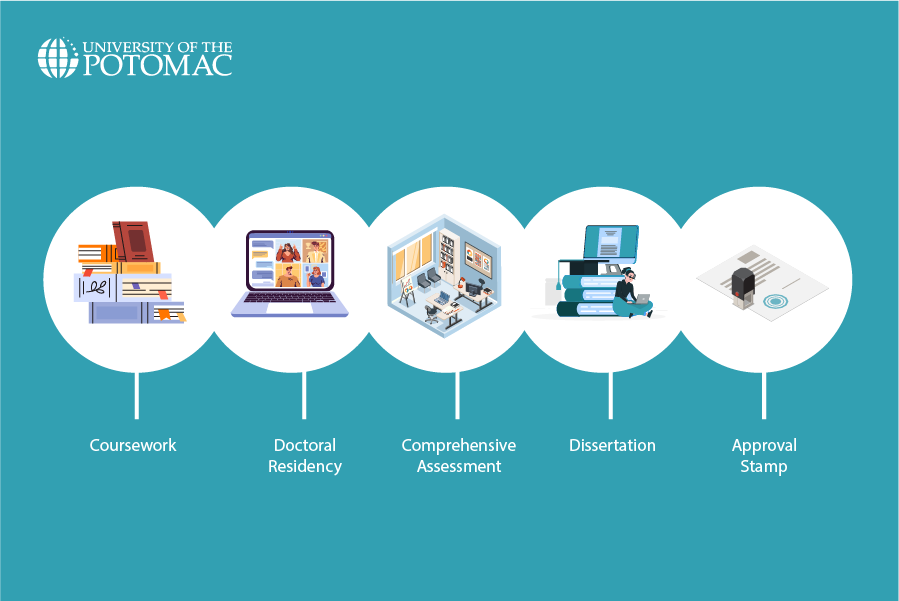Ever wondered why someone with the title “Doctor of Philosophy” isn’t necessarily pondering the mysteries of existence like Descartes or Nietzsche? That’s because the term encompasses many disciplines beyond its traditional confines. Whether it’s exploring the mysteries of the cosmos, deciphering intricate economic systems or unraveling the complexities of human behavior, a Ph.D. can be earned in any field ranging from science and economics to humanities and beyond.
In this article, we’ll explore the multifaceted world of Ph.D. studies, beginning with the fundamental question: What does Ph.D. stand for?
Beyond merely defining the acronym, we provide crucial information to assist you in determining whether pursuing this advanced degree aligns with your goals, aspirations and intellectual passions.
Meaning of Ph.D.
A Ph.D., short for Doctor of Philosophy, is an esteemed academic degree marking the pinnacle of in-depth study and innovative research in a specific area of expertise. Attaining a Ph.D. involves not just a broad mastery of the field at large but also acquiring specialized knowledge and insights into a distinct facet of that discipline.
For instance, pursuing a Ph.D. in literature involves acquiring a thorough understanding of literary theory and criticism while also focusing deeply on a particular literary period or genre, such as Victorian literature, postcolonial literature, or contemporary poetry. This process ensures that Ph.D. candidates achieve a comprehensive grasp of their broader discipline while also cultivating an expert-level specialization.
Education Requirements for a Ph.D.
In order to pursue a Ph.D. program, you must first fulfill some education prerequisites. Both a bachelor’s degree and often a master’s degree serve as essential stepping stones toward this advanced academic pursuit.
Bachelor’s degree
A bachelor’s degree is a fundamental requirement for individuals who aspire to pursue higher education, including Ph.D. studies. Although having a major directly related to the intended Ph.D. field is not mandatory, it can undoubtedly provide a beneficial foundation for handling advanced coursework. Therefore, aligning undergraduate studies with future graduate pursuits can significantly ease the transition into more advanced academic pursuits, ensuring a smoother progression through graduate coursework.
Master’s degree
To be eligible for Ph.D. programs, candidates typically need to have completed a master’s degree. The duration of a master’s degree program can vary depending on whether a student is enrolled part-time or full-time, but typically it lasts between one and three years.
Maintaining a high GPA during master’s studies can improve your chances of getting into a Ph.D. program. Generally, a GPA of 3.0 or higher is seen as favorable. However, this can vary based on factors like your field of study and the program’s competitiveness.
How Long Does a Ph.D. Take?
The typical duration of a Ph.D. program ranges from five to six years, yet this timeframe can vary significantly depending on the academic field and individual circumstances.
Several factors play a pivotal role in determining the length of Ph.D. studies. Firstly, the depth and breadth of the research project can significantly influence the timeline. The dissertation phase, which involves original research, data analysis, and presenting your findings, often requires a considerable amount of time. Secondly, the availability of funding and resources is crucial. Access to financial support and adequate research facilities can either speed up the process or cause delays.
Moreover, specific program or institutional requirements, such as compulsory coursework, teaching commitments, or comprehensive exams, may affect the overall timeline. These obligations can increase the academic workload, potentially prolonging the time necessary to fulfill all degree requirements.
The Process of Obtaining a Ph.D.

The process of obtaining a Ph.D. is a journey that involves passing through various milestones and academic achievements, each contributing to the culmination of advanced scholarly expertise. Let’s go through some of the steps below:
Completing coursework
Coursework is a foundational step in the Ph.D. process, helping students cultivate profound subject-matter expertise and establish essential knowledge within the field. These courses equip students with the requisite theoretical framework and shape potential dissertation research topics.
Completing one or more doctoral residency experiences
Doctoral residencies provide a structured platform for refining research skills, receiving guidance, and engaging in scholarly discourse. Often conducted virtually, these experiences allow students to focus on specific study and dissertation preparation activities while fostering connections with faculty and peers for invaluable mentorship and collaboration.
Passing a comprehensive assessment or exam
The purpose of the comprehensive examination process is to comprehensively evaluate the student’s depth of knowledge in their area of specialization and their familiarity with the published research within the field. Additionally, the examination verifies whether the student possesses the critical thinking and analytical skills required for dissertation research.
Developing and completing an independent research project
The dissertation is a comprehensive written document that typically consists of five chapters and addresses a unique question or problem within the field. Faculty experts and the ethical review board play integral roles in assessing the rigor and ethical aspects of the research project, ensuring scholarly integrity and adherence to ethical guidelines.
Seeking approval of your completed dissertation manuscript
The approval process entails evaluation by a faculty committee and the school dean, culminating in a final defense where students defend their research, analysis, and conclusions. Meeting specific professional standards, as applicable to the field, is often a requirement before the publication of the approved dissertation, marking the culmination of the Ph.D. journey.
Career Opportunities for Ph.D. Holders
Ph.D. holders are equipped with a wealth of specialized knowledge and advanced skills, opening doors to many career opportunities that vary depending on their field of study. The roles they can pursue encompass a wide range of leadership, managerial, research, academic, and consulting positions, such as:
Interested in pursuing a degree?
Fill out the form and get all admission information you need regarding your chosen program.
This will only take a moment.
Message Received!
Thank you for reaching out to us. We will review your message and get right back to you within 24 hours.
If there is an urgent matter and you need to speak to someone immediately you can call at the following phone number:
- We value your privacy.
- Chief Executive Officer (CEO)
- Chief Operating Officer (COO)
- Chief Financial Officer (CFO)
- Chief Technology Officer (CTO)
- Chief Information Officer (CIO)
- Vice President (VP) of Research and Development
- Vice President (VP) of Innovation
- Director of Research
- Director of Development
- Research Scientist
- Principal Investigator
- Senior Consultant
- Academic Dean
- Head of Department
- Professor or Lecturer
- Senior Policy Analyst
- Executive Director of a Nonprofit Organization
- Editor-in-Chief
- Senior Analyst
- Entrepreneur
5 Reasons to Get a Ph.D.
The decision to pursue a Ph.D. is a significant one that holds the potential to shape both your career trajectory and personal growth. Here are five compelling reasons why pursuing a Ph.D. may be worth considering:
Become an expert in the field
One of the primary motivations for pursuing a Ph.D. is the opportunity to become an expert in a specific field. Obtaining expert-level knowledge allows you to contribute significantly to your chosen field while providing you with a sense of fulfillment and accomplishment.
You can make a difference through research
The true value of a Ph.D. lies in the potential to make a positive impact through research. Across various fields, impactful research has the power to drive innovation, solve pressing societal challenges, and advance human knowledge. Whether it’s discovering new treatments for diseases, developing sustainable technologies, or understanding complex social phenomena, Ph.D. research has the potential to change the world for the better.
Broaden your job opportunities
In today’s competitive job market, a Ph.D. can set you apart from the crowd. While it’s highly relevant for academic careers, a Ph.D. also opens doors to diverse opportunities in industries ranging from technology and healthcare to finance and government. Employers value the advanced research, analytical, and critical thinking skills that Ph.D. holders bring to the table, making them highly sought after in various professional settings.
Increase your salary potential
Earning a Ph.D. can lead to significant financial benefits in the long run. According to the Bureau of Labor Statistics, Ph.D. holders typically command higher salaries and have lower unemployment rates. While the journey toward a Ph.D. may require dedication and perseverance, the potential for increased earning potential is a compelling incentive for many aspiring scholars.
You can reach your full potential
Perhaps the most rewarding aspect of pursuing a Ph.D. is the opportunity for personal growth and development. Along the way, you’ll acquire valuable skills, including resilience, problem-solving, and effective communication, that will serve you well professionally and personally. By pushing yourself to tackle complex problems and overcome obstacles, you’ll reach your full potential not only as a scholar but also as an individual ready to leave their mark and make a meaningful difference in the world.
Final Thoughts
Ultimately, Ph.D. programs are indispensable components of the academic journey for individuals seeking to enhance their expertise, enrich scholarly knowledge, and pursue fulfilling careers in academia, industry, and beyond.
As you reflect on your academic and professional aspirations, consider the transformative potential of pursuing a Ph.D. program tailored to your passions and ambitions. So, dare to delve deeper, embrace the challenge, and pursue this path of intellectual discovery and personal growth.
Frequently Asked Questions
Is a Ph.D. harder than a master’s degree?
While both degrees require significant dedication and effort, a Ph.D. typically involves more extensive research and independent study, making it a more demanding academic pursuit than a master’s degree.
Which is higher: Ph.D. or doctorate?
A Ph.D. lies within the category of doctorate degrees, so one is not inherently higher than the other.










